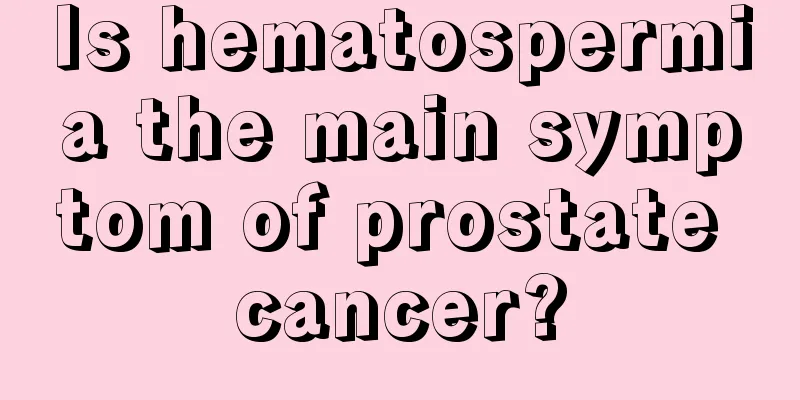Is hematospermia the main symptom of prostate cancer?

|
Hematospermia is not necessarily a major symptom of prostate cancer, but it needs to be taken seriously and promptly examined by a doctor. Hematospermia may be caused by a variety of reasons, including prostatitis, seminal vesiculitis, urethral injury, etc. Prostate cancer is just one of the possibilities. Treatment should be based on the specific cause, including medication, lifestyle adjustments, or surgical intervention. 1. Common causes of hematospermia include prostatitis, seminal vesiculitis, and urethral injury. Prostatitis is an inflammation of the prostate tissue, which may be caused by bacterial infection or non-infectious factors, and manifests as frequent urination, urgency, and pain during urination. Seminal vesiculitis is an inflammation of the seminal vesicle, which often occurs at the same time as prostatitis and may cause blood in semen. Urethral injury may be caused by trauma, sexual behavior, or medical procedures, causing blood to mix into semen. 2. Prostate cancer may also cause hematospermia, but it is not the main symptom. The early symptoms of prostate cancer are not obvious, and may include dysuria, frequent urination, and urgency. In the late stage, symptoms such as hematuria and bone pain may appear. Hematospermia is a rare symptom of prostate cancer, but if it is accompanied by other symptoms, you need to be highly vigilant. 3. Treatment of hematospermia should be based on the specific cause. For prostatitis or seminal vesiculitis, antibiotics such as levofloxacin and cephalosporins are commonly used for treatment, and physical therapy such as hot water bath and prostate massage can be used at the same time. Urethral injury should avoid further stimulation, and urethral repair surgery should be performed when necessary. If prostate cancer is suspected, prostate-specific antigen PSA testing, imaging examinations and biopsy are required for diagnosis. Treatment methods include surgical resection, radiotherapy, hormone therapy, etc. 4. Lifestyle adjustment plays a positive role in preventing and alleviating hematospermia. Avoid excessive sexual activity or masturbation to reduce congestion of the prostate and seminal vesicles. Maintain a regular work and rest schedule, avoid sitting for long periods of time, and do appropriate aerobic exercise such as walking and swimming to promote blood circulation. Eat more foods rich in vitamins C and E, such as citrus fruits and nuts, to enhance antioxidant capacity and reduce inflammation. Although hematospermia is not necessarily the main symptom of prostate cancer, it is necessary to seek medical attention in time to identify the cause and receive targeted treatment. Drug treatment, lifestyle adjustments and necessary surgical intervention can effectively relieve symptoms and prevent disease progression. |
>>: Can FH gene-deficient renal cancer be cured?
Recommend
What are the advantages and disadvantages of abdominal breathing?
Abdominal breathing is a very popular way of brea...
What should I do if my knees are cold and painful
Knee pain caused by cold is actually something th...
Be cautious about rectal cancer metastasis
Rectal cancer is a very dangerous disease that is...
What are the complications of advanced pancreatic cancer?
What are the complications caused by pancreatic c...
Can pregnant women use a hair dryer?
Pregnant women have some taboos in their lives du...
Does a fat guy look good with short hair?
In daily life, many girls have chubby faces. It i...
Are hemorrhoids a precursor to rectal cancer?
Hemorrhoids are not a precursor to rectal cancer....
Symptoms of cervical neuralgia
In our lives, many people often feel pain in the ...
What are the symptoms of stage III nasopharyngeal carcinoma
What are the symptoms of stage III nasopharyngeal...
How about using Tremella fuciformis instead of bird's nest
Both bird's nest and white fungus are ingredi...
Why do my legs swell after standing for a long time?
Sitting or standing for a long time will cause le...
How long does it usually take to detect throat cancer
How long does it usually take to detect throat ca...
Is advanced bladder cancer contagious?
Nowadays, people's living standards have impr...
Vomiting a small amount of blood
Vomiting is a physiological reaction that occurs ...
How to make the pan non-stick?
In daily life, pots are kitchen utensils that we ...









